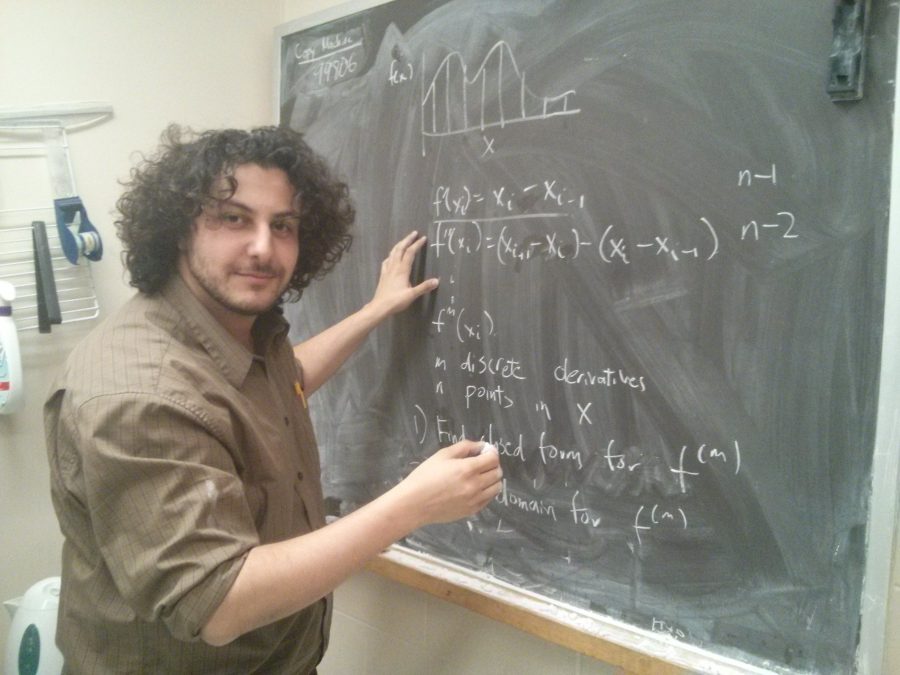Joseph Paul Cohen, one of three UMass Boston students to be awarded a Graduate Research Fellowship from the National Science Foundation (NSF) in the Spring 2013 semester, once quit his job at Stop and Shop in what he calls “the best way ever,” yelling “Freedom!” as he exited the building. “Everybody was clapping,” he says. “It was great!”
He holds firm opinions. He doesn’t like scented markers, because, he says, “You shouldn’t be smelling markers!” He feels that “people that use whiteboards don’t have true respect for mathematics.” He is “really really good at Microsoft stuff,” but he refers to this skillset as “the black art.” He says things like “Bluetooth is terrible for developers!” and “The internet is really easy!” because for him, both these statements are obvious truths.
“Is that absurd?” he asks. “I don’t know that it’s a good idea to publish all of that.”
But Cohen isn’t just a man who prefers chalkboards — he’s an accomplished computer scientist. The fellowship he won has been awarded to about 46,500 graduate students of the more than 500,000 who applied in the past 61 years. Before 2013, only a single student at UMass Boston had ever won a Graduate Research Fellowship.
Cohen worked at Fidelity Information Services and the Boston University School of Dental Medicine while earning his associate’s degree at MassBay Community College, then transferred to UMass Boston in 2008. This award grants him both prestige and three years of financial support — an annual stipend of $30,000 with an extra $12,000 to fund his education.
The fellowship is the latest of Cohen’s several distinctions. In the summer of 2010, the NSF gave him funding as a part of the Research Experience for Undergraduates (REU) program, and he began working with his advisor, Professor Wei Ding, on software that can detect craters by looking at photographs of a planet.
In the summer of 2011, Cohen received another REU for work with Ding. This time, the pair organized two Mars Weekend events at the Museum of Science in Boston. For these events, Cohen developed a web-based game in which the player drives a rover around a virtual Mars. This work was published in Lunar and Planetary Institute Science Conference Abstracts.
That fall, Cohen received an Undergraduate Research Funding award from UMass Boston so that he could continue to work — under Ding’s supervision — to improve software that can detect craters. This time around, the work produced by Cohen and Ding was published at the 24th Australasian Joint Conference on Artificial Intelligence.
Cohen then worked on another method for speeding up and making more accurate the process of crater detection (using “a method that’s actually inspired by the Peter Gabriel song ‘Shock the Monkey’”), which was published at the 19th ACM Sigspatial International Conference in Chicago. He won an NSF Travel Award to attend.
Cohen also won a Taffee Tanimoto Award for Service from UMass Boston in 2011, and was nominated for a UMass Boston Beacon Undergraduate Student Leadership Award by his department.
Cohen currently teaches CS 105, “An Introduction to Computer Concepts.” He’s worked with the Women in Science Club at UMass Boston, mentoring two female undergraduate students from the computer science department, and he’s been teaching computer science to 8th-grade girls in Boston’s Tech Savvy Computing Camp every summer since 2010.
He explains, “The first year I did it, I didn’t think as highly as I do now of 8th graders,” but then he changed his mind. “You can’t assume that they can’t do things. …They’re serious. They’re not immature.”
Cohen has worked with Professor Ronald Cheung to help teach his fellow students about cyber security. He has run security workshops in his department, and a workshop for the public at the Museum of Science. He is the creator of an app designed to decrease the amount of time it takes students to sign into UMass Boston’s wifi network, and he is the author of the open letter published in the Mass Media on March 28, in which he explained what he believes are the problems with UMass Boston’s information technology services for students.
This topic is another one that elicits a strong response from Cohen. “I’ve tried, I’ve struggled, I’ve worked really hard. Then I’m at this point: I’m still at a university that doesn’t let me do things on the internet. I go to other universities to learn things.”
Cohen says that after other students read his open letter, “I’m afraid that they would get depressed that they’re going to a university where they’re actually disadvantaged. … That’s another reason it needs to be fixed right now, because it’s not healthy for students.”
Cohen hopes UMass Boston’s Information Technology Services Division will take his letter more seriously now that he’s won the fellowship. At the same time, he’s aware that the person who benefits most from the award is him.
“It’s pretty outrageous,” he says, adding, “It’s the best thing that could ever happen for my career. I’m in a different class of researcher at this point.”
His plans for the future are flexible. “I definitely want to start up companies … but industry’s really not fair.” He thinks about becoming a politician, and feels that opening a coffee shop might lead to “a really rewarding life.”
He’d also be happy in academia. “At first I didn’t want to be a professor, but I think it’s growing on me. I do like to teach.”
Cohen is not a fan of Bluetooth, so he wrote an app called Blucat to "make it better."






















































